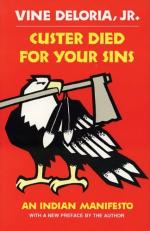
|
| Name: _________________________ | Period: ___________________ |
This quiz consists of 5 multiple choice and 5 short answer questions through Part 2.
Multiple Choice Questions
1. What did Lake Superior hold that the government wanted?
(a) Fishing rights.
(b) Copper and other minerals.
(c) Shipping rights.
(d) Water.
2. What two tribes seem to have traditional Indian values still intact?
(a) The Apaches of the Southwest and the Northwest Coast Indians.
(b) The Alaskan Inuits and the Pueblos of New Mexico.
(c) The Nez Perce and the Sioux.
(d) Pueblos of New Mexico and the Apache of the Southwest.
3. Who signed the original treaties with the Northwest Coast American Indians?
(a) Theodore Roosevelt.
(b) George Bush.
(c) Isaac Stevens.
(d) Abraham Lincoln.
4. What did treaties initially do?
(a) They marked the boundaries between the lands of the Indian nations and the U.S.
(b) They promised ownership of land that still belonged to the French.
(c) They divided the church territories.
(d) They helped establish state lines.
5. What is the purpose of the Oklahoma Original Cherokee Community Organization?
(a) Defending school financing on the Cherokee Reservation.
(b) Defending hunting and treaty rights of the Cherokee.
(c) Defending water rights for the Cherokee Nation.
(d) Defending marriages on the Cherokee Reservation performed by Native American Ministers.
Short Answer Questions
1. What other name is the Dawes Act known by?
2. What year did the United States clear the eastern states of the former Indian allies?
3. Which American Indian tribe is the author a member of?
4. When the frontier was closed in 1890, what did American enter into next?
5. A 1791 Treaty with the Cherokees included what provision?
|
This section contains 295 words (approx. 1 page at 300 words per page) |

|




